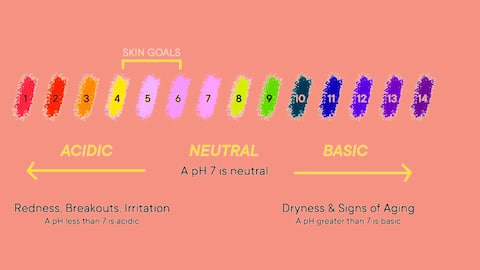Understanding the importance of skin pH
What's the story
Our skin serves as a vital barrier against bacteria, pollutants, and UV radiation, emphasizing the significance of its potential hydrogen or pH balance. Skin pH, determining its acidity or alkalinity, is pivotal in regulating its health and functionality. Recognizing the importance of skin pH is fundamental in preserving skin vitality and radiance, as it governs essential physiological processes crucial for overall skin well-being.
About pH
What is pH?
The pH scale, ranging from one to 14, marks seven as "neutral," below seven as acidic, and above seven as alkaline. Our skin's pH of 4.5 to 5.5, slightly acidic, helps defend against microbes and free radicals that accelerate aging. This acidity creates an unfavorable environment for bacteria. Maintaining skin pH presents challenges, requiring careful management to uphold its protective function against harmful elements.
Significance
Protective barrier function
The skin's acidic pH is crucial for its barrier function. The outer layer, the stratum corneum, composed of dead skin cells and lipids, relies on this acidity to maintain integrity, preventing water loss and deterring harmful microbes. Disruption of the skin's pH can compromise its barrier function, leading to issues like dryness, sensitivity, and increased susceptibility to infections.
Skin microbiome
Microbial balance
The skin is home to a diverse ecosystem of bacteria, fungi, and other microorganisms collectively known as the skin microbiome. A slightly acidic pH creates an environment that is conducive to beneficial bacteria while inhibiting the growth of pathogenic organisms. When the skin's pH becomes imbalanced, it can disrupt this delicate microbial balance, potentially leading to conditions like acne, eczema, and dermatitis.
Physiological processes
Maintenance of skin health
The skin's pH influences various physiological processes, including cell turnover, sebum production, and wound healing. An acidic environment promotes proper wound closure and tissue regeneration. Therefore, maintaining an optimal pH level is essential for supporting these processes and promoting overall skin health. Imbalances in pH can impair the skin's ability to repair itself, leading to delayed wound healing and exacerbation of inflammatory conditions.
Harsh cleansers
Factors affecting skin pH
The skin's natural pH balance can be disrupted by various factors. Harsh cleansers and alkaline skincare products may cause irritation and dryness by altering the skin's pH. Environmental elements such as UV radiation, pollution, and harsh weather conditions can also impact pH levels. Additionally, aging often leads to a more alkaline pH, potentially resulting in dryness and sensitivity.
Disadvantages
Normal pH
An imbalanced pH, tilting towards alkalinity, may result in flaky, red skin, while excessive acidity heightens the risk of inflammatory conditions such as eczema and acne. Cleansers with a pH exceeding nine can excessively dry and strip the skin, while compromising its acid barrier, potentially leading to wrinkles due to dehydration. Therefore, maintaining a normal skin pH is crucial for smooth and healthy-looking skin.
